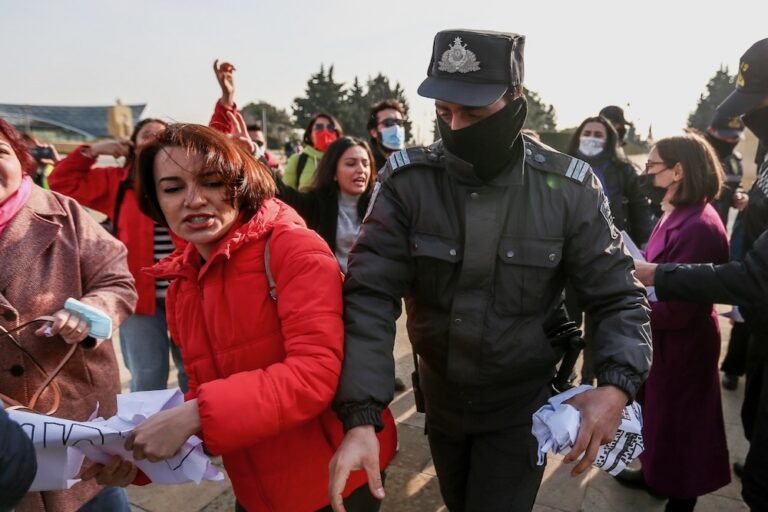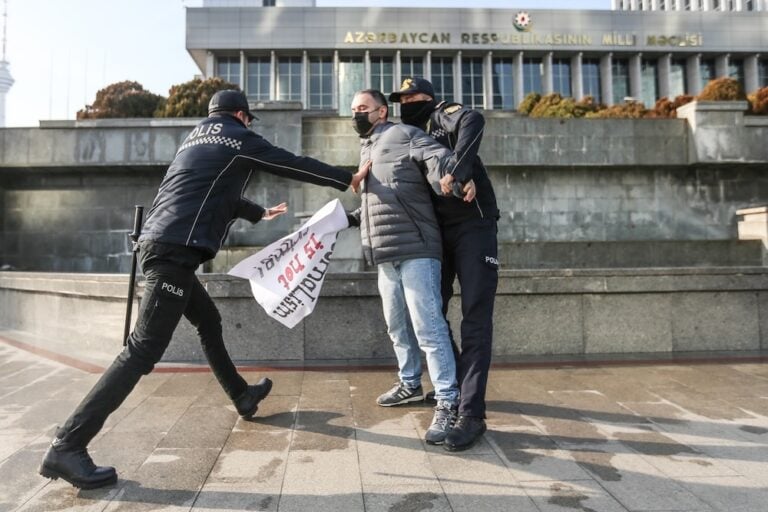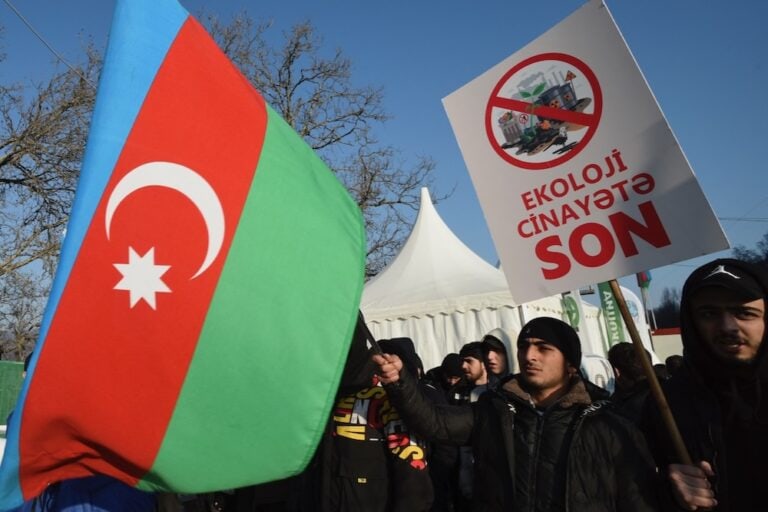(ARTICLE 19/IFEX) – The following is an 18 July 2002 ARTICLE 19 letter to Azerbaijani President Heydar Alijev: 18 July 2002 HE Heydar Alijev President of the Republic of Azerbaijan Office of the President 19 Istiqlaiyyat St. Baku Azerbaijan Fax: 00 994 12 92 06 25 ARTICLE 19, the Global Campaign for Free Expression, is […]
(ARTICLE 19/IFEX) – The following is an 18 July 2002 ARTICLE 19 letter to Azerbaijani President Heydar Alijev:
18 July 2002
HE Heydar Alijev
President of the Republic of Azerbaijan
Office of the President
19 Istiqlaiyyat St.
Baku
Azerbaijan
Fax: 00 994 12 92 06 25
ARTICLE 19, the Global Campaign for Free Expression, is very concerned at the news of the measures that have been taken against the newspaper Famida, whose case is due to be considered by the Supreme Court on 31 July 2002.
According to our information, the newspaper was sued for defamation due to the article “Deputy Prosecutor of Nasimi District Works for NSM?”, published on 21 July 2001. The article accused the Deputy Prosecutor Tofiq Alioglu Kerimov of being incompetent and having as a result been transferred from the Prosecutor’s office to the department of observation of traffic regulations. The Yasamal District Court on 1 October 2001 ruled against the newspaper and imposed its closure and a fine of 100 million manat (equivalent to the media outlet’s three-monthly turnover), on the basis of Article 19 of the Mass Media law and Article 23 of the Civil Code.
The newspaper in turn started a legal action against Mr Kerimov, which was heard by the Court of Appeal on 6 December 2001, claiming that the legal suit had damaged its business reputation. However, the Court of Appeal found the appeal groundless and upheld the decision of the Yasamal District Court to impose a fine and close the newspaper. The newspaper once again made an attempt to appeal the decision on 8 May 2002 and the Supreme Court is now due to consider the case on the 31st of July. Despite the fact that a final judgement is still pending, the initial ruling was executed, resulting in the closure of the media outlet.
ARTICLE 19 notes with concern the harshness of the penalty. No defamatory statement, no matter how egregious and blatant, should warrant the closure of a media outlet or the imposition of other severe penalties such as disproportionate fines. The legitimate purpose of defamation laws should be to redress the harm caused by the impugned expression rather than to punish a media outlet. Instead, in addition to the suspension of the activity of the media outlet, the Yasamal District Court has imposed the harshest pecuniary remedy permissible under Article 19 of the Mass Media Law. This, taken in conjunction with the loss of earnings resulting from the closure of the newspaper, are likely to have an extremely severe impact on the newspaper, especially in the context of Azerbaijan’s current economic difficulties. Such measures create a ‘chilling effect’ on the work of the media, leading journalists to resort to self-censorship, with an adverse impact on the public’s right to know.
The judgements of the two courts are in violation of the principles arising from the jurisprudence of the European Court of Human Rights, which, given Azerbaijan’s ratification of the European Convention on Human Rights, the Azeri government is obliged to apply in all its courts. These principles provide that public officials should tolerate more criticism than ordinary citizens, and that information in the public interest be disclosed. The possible incompetence of Mr Kerimov is a matter of public interest, as his work is paid by and has an impact on the Azeri people.
Finally, the judgements of the two courts show that there was not a sufficient attempt to establish the truth of the allegations, and that the courts also did not consider a defence based on reasonable publication, by assessing whether the newspaper had acted in ‘good faith’.
Article 19 of the Mass Media Law (allowing for the possibility to close a media outlet by court order) was subsequently modified by a series of amendments aimed at ensuring greater compliance with the European Convention on Human Rights. ARTICLE 19 welcomes this important step. However, having this case arisen prior to the adoption of the amendments, the old Article 19 is still being applied in this particular case. It is disappointing that, despite the legal developments for harmonisation with international standards, the practice suggests that the media is still experiencing intimidation by being excessively penalised by the courts. The abandonment of such practices is a prerequisite for the creation of a healthy and independent media.
ARTICLE 19 calls upon the Azeri government to allow Famida to resume its activities and to abandon the practice of imposing disproportionate penalties on media outlets in defamation cases. It also calls upon the Supreme Court to take into consideration the law and practice of the European Court of Human Rights while deciding on this case next Wednesday.
Yours sincerely,
Luitgard Hammerer
Head of Europe Programme
cc: Mrs Sudaba Hasanova, Chairwoman of the Supreme Court
Zakir Gararov, General Prosecutor
Recommended Action
Similar appeals can be sent to:HE Heydar Alijev
President of the Republic of Azerbaijan
Office of the President
19 Istiqlaiyyat St.
Baku, Azerbaijan
Fax: +994 12 92 06 25Please copy appeals to the source if possible.


